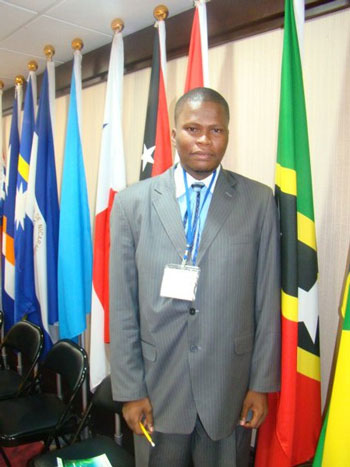 As the President of MISOPLWHA an OECS based non governmental organization which stands for Media In Support Of People Living With HIVAIDS I am very happy to once again to attempt at garnering support as we celebrate yet another World AIDS Day today.
As the President of MISOPLWHA an OECS based non governmental organization which stands for Media In Support Of People Living With HIVAIDS I am very happy to once again to attempt at garnering support as we celebrate yet another World AIDS Day today.It is very important to note that since 1988, the day December 1st has been a day of bringing messages of compassion, hope, solidarity and understanding about AIDS to every country in the world. We within the Caribbean has been no different with many of us reflecting on relatives and friends who have died while trying to mobilize support as we desperately seek to reduce stigma and discrimination which continues to be the greatest fight in curbing the rapid spread of the disease.
As such, it is noted that each year there is a particular theme chosen for Word AIDS Day, and for this year, 2010 it is 'Universal Access & Human Rights.'
I, however beg my media colleagues primarily and every person out there to not to forget to wear their red ribbon. We must know that wearing the ribbon is a symbol of ending stigma and discrimination. There is no need for me to remind my media colleagues throughout the OECS about the power and unbelievable influence of the media and therefore ending stigma and discrimination should be a battle that we should seek aggressively to pursue.
I want to state that the ribbon is an international symbol of AIDS awareness that is worn by people all year round, but particularly around World AIDS Day to demonstrate care and concern about HIV/AIDS, and to remind others of the need for their support and commitment.
It is important to note that women now represent about the half of the people living with HIV. However, today the majority of persons who become HIV-positive and who die of AIDS in developing countries are women. It was pointed out that several factors which are rooted in social relations and women's economic realities contribute to the fact that women now are becoming infected at a faster rate than men.
MISOPLWHA strongly believes that sexual relations between young women and older men are frequent, in particular in arranged marriages which are very prevalent in countries like Guyana and Trinidad and Tobago. Often, the older husband helped the girl's family financially. These intergenerational marriages increase the risk for the young women to be infected with HIV, because according to UNAIDS statistics older men are more likely to be HIV-positive and to infect their young partner. Moreover the risk of infection for young women is greater because the lining of the neck of the womb is not fully developed.
MISOPLWHA believes that the media in the respective countries have a vital leadership role to play in changing attitudes through their newspapers, radio, televisions, websites and blogs in the modern days of communication and the wider community at large. Responsible and aggressive journalists when covering health issues more in particular HIV/AIDS should be diligently sought after thus ensuring that issues such as gender inequality in the context of HIV/AIDS can be effectively publicized.
I however would like to urge my fellow colleagues to join with this organization in pursuing the following; Unions should pursue several lines of action, among them:
- Effectively address the low status of women as the main means to combat violence against women and girls
- Support HIV- positive women and children
- Through our influence as media practitioners to strive towards campaigning for financial assistance to be provided to HIV- positive workers in order for them and their families to have access to treatment or to encourage workplace medical facilities to diagnose and treat STIs which increase the risk of transmission of HIV
- Provide information and education for men which includes sexual and reproductive health
I want to stress that women are especially exposed to the consequences of HIV/AIDS. As I indicated earlier that UNAIDS statistics have stated that AIDS exacerbates the unequal division of work and responsibilities. Retracing the traditional domestic role of women indicates that girls and women are more likely to provide care for the sick relatives and they will have the double burden of contributing also to household income.
As such, this situation reduces the educational opportunities for girls and young women and limits their opportunities to achieve financial independence. Many persons are of the view that HIV/AIDS doesn't affect them but I beckon to warn that in developing countries, when their partners die of AIDS, women often find themselves without any financial security, economic opportunities or social protection. HIV-positive women face a similar situation. Many of them are stigmatized and abandoned because of their disease. When they are sick and forced to leave their economic activities they lose their precarious livelihood.
Research continues to show that women are more likely than men to be stigmatized, ostracized and destitute. HIV/AIDS-related discrimination among media practitioners can pose enormous challenges to those living and or affected by the disease thus I end by appealing to all to use our roe as media colleagues and members of society to help in ending stigma and discrimination. This is very important if we are going to succeed at curbing the spread of this very powerful disease.
I thank you and sincerely trust that for those not on board that they will seek at making their contribution in a positive and meaningful way.









